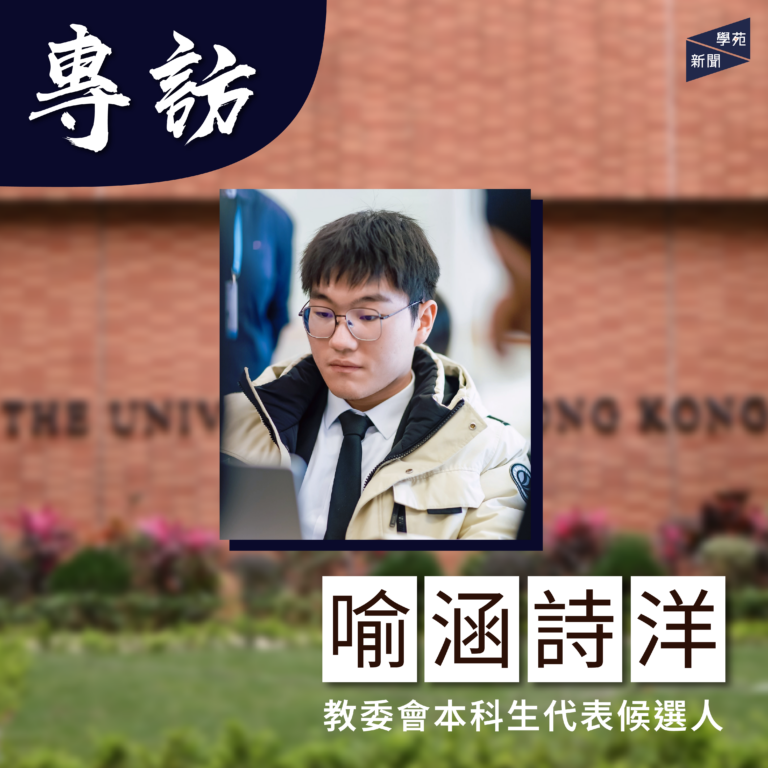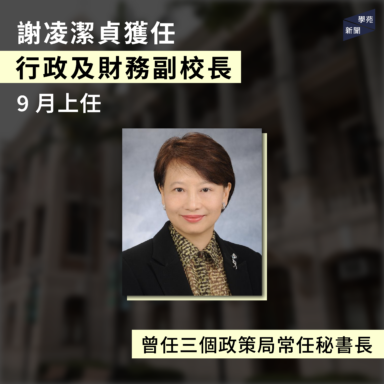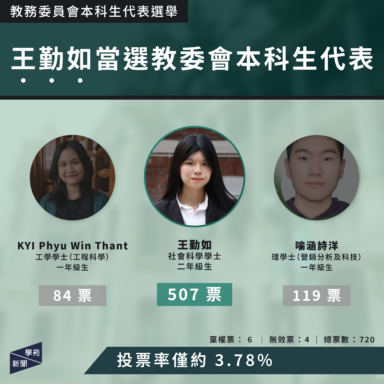
[Please scroll down for English version]
5 月 28 日 17:40 更新:校務委員會本科生代表鄧俊彥昨( 5 月 27 日)於其 Instagram 帳戶表示,其不認識喻涵詩洋,亦未與喻討論重建學生會事宜。喻今於社交平台「HKU 噗噗」中回應選民詢問,指此為口誤,原意是想表達未來會和校委會代表加強聯繫與溝通,並指如果引起爭議非常抱歉。
另外,何立仁副校長(教學)今回覆本報查詢時指,其對喻涵詩洋的姓名沒有印象(Don’t recognise this name),也不記得自己曾和喻團隊中的人會面(Not aware of having met with his team)。喻回應指,是一名大四學生和他們在 GPA 等問題上想法類似,該學生獲學生事務長謝樹基邀請,與謝及何立仁副校長(教學)於 5 月 23 日面談。喻隨後向本報確認,該大四學生並非其競選團隊成員。
該大四學生向本報指出,其與校方進行了上述面談,喻沒有出席。
28th May 17:40 update: On 27th May, Undergraduate student representative to the Council Tang Chun Yin claimed on his Instagram account that he did not know YU Hanshiyang and did not discuss matters related to rebuilding the Student Union with YU. YU responded to the elector’s enquiry on social media ‘HKU PUPU’ today, saying that this is a slip of the tongue, he intended to say he will enhance communication and connection with Tang in the future. He apologised for any controversy it may cause.
According to the reply from Vice-President & Pro-Vice-Chancellor (Teaching and Learning) Ian Holliday, he does not recognise YU’s name and is not aware of having met with anyone from YU’s team. YU responded by saying it is a year 4 student who has similar thoughts with them on GPA issues that was invited by Dean of Student Affairs Tse Shu Ki Samson to meet with Tse and Ian Holliday on 23rd May. YU confirmed to Undergrad that the year 4 student is not part of his election team.
The year 4 student told Undergrad that he had met with the school and YU did not attend the meeting.
【學苑專訪】香港大學教務委員會本科生代表選舉投票將於明日(5 月 27 日)上午 10 時至 5 月 29 日下午 5 時於線上舉行,三名候選人競逐一個席位。本報訪問候選人 KYI Phyu Win Thant、王勤如(WONG Kan Yu)和喻涵詩洋(YU Hanshiyang),了解其政綱及理念。
喻涵詩洋之專訪內容如下。
問:請簡單介紹自己,並簡述參選原因。
喻:我叫喻涵詩洋,就讀營銷分析及科技一年級。作為內地本科生,我深刻體會到跨文化交流和學術公平的重要性,所以參選教委會本科生代表。我希望為所有學生爭取更公平的學習環境,提高學術考核和宿舍權益的制度。我目前組織了 5 至 6 人的競選團隊,一起完善競選綱領及搜集大家的意見。
問:請介紹你的政綱以及你最希望在任期內完成的工作。
喻:我的政綱有四個方向。第一是提升成績平均積點(GPA)。港大作為香港著名的「壓分」學校,在積點制度上有很多不公平的地方。內地與外國的許多學校獲 A 級相對容易,導致港大學生和其他學校競爭研究生或博士時,處於 GPA 相對不利的地位。我的目標是透過和學校溝通,將 A 級和 B 級的機率提升至 30% 及 40%,並將不合格率保持至 5% 以下。大家或會擔心會否造成積點迅速膨脹或對部分同學不公平,故我提議進階式提升,逐步達成目標。這可能需要花更長時間,但是非常有必要的。
第二點是宿舍評分制度公開透明化。對非本地生評分時,除了 GPA 的可量化評分標準外,也要公開他們參加多少個社團活動或比賽才能獲相應的分數。
第三點是本地生較關心的學生會。我之前有和校委會代表溝通,如果有可能,我願意和他們合作。在現行的法律下,一個能反映港大學生呼聲的學生會仍然有必要性。如果能促進學生權益,我願意和大家一起重塑包容和諧的學生會。
第四點是推動校企合作。我所在的商學院已有很多和企業合作的內容,我覺得可以推動更多。在國內,如騰訊等高科技企業會舉辦很多比賽,但香港因為其作為特區的特殊性,有很多活動沒有開展。我覺得可以利用深圳和香港毗鄰的優勢,幫助更多高科技企業和香港大學合作,讓大家能夠參與他們的求職活動,緩解大家的就業壓力。
問:就提高 GPA 的目標,你根據甚麼準則定下 30%、40% 和 5% 的標準?
喻:主要基於類似歐美學校的比例。據我自己調查,可能因為老師不同,法學院和文學院獲得 A 及 B 級的機率和商學院不一樣。商學院相對「好 grade」,理學院和法學院則是出名的「爛 grade」。這個機率是我參考了在多倫多和賓夕法尼亞的高中同學,大家一起討論自己學校的比率。
問:你有就此和相關教授進行初步溝通,或了解校方的意願嗎?
喻:我與選舉團隊中一名大四學生一起制訂議程,發給何立仁副校長,並被其邀請談話,讓他了解大家的訴求。我相信大家及後可能會收到相關消息。透過向校方反映 GPA 制度的問題,能更好體現大家的參與度和呼聲。
問:可否透露何立仁副校長(教學)對此事的初步看法?
喻:目前還不太方便透露,這是屬於相對機密的內容。如果校方有相關動作,或在可以公開的時候就會公開。
問:你於政綱中提及住宿處(Housing Office),這是甚麼機構?
喻:我對宿舍相關的機構沒有那麼了解,住宿處可能是代指一個比較泛的機構。就我理解,學校有分配宿舍的機構,包括宿舍委員會,我覺得 Housing Office 是港大制定評分標準的對應機構。
問:就重建學生會之目標,你認為學生會的工作是甚麼?
喻:我認為香港大學內地本科生聯會(CSSAUD, HKU)和港大全校的學生會相似,如果我競選成功,繼續留在港大,我也會去競選 CSSAUD 的會長。他們會舉辦歌唱比賽或類似深夜糖水的福利活動,亦會保護學生權益,通過學生會進行申訴及反映,體現學生力量的作用。在港大建設制度的過程中,學生會始終是一股非常重要的力量。儘管學生會在過去幾年有爭議,被短暫地取締,但未來若能在法治的條件下,建立一個真正能推動社團活動、學生生活的學生會,對學生生活提升有極大幫助。
問:你作為教委會代表,與其他參與重建學生會的持分者有何分工?
喻:教委會的職責更多關於課程設置和學生福利,有別校委會。我們與校委會一名本科生代表有聯繫,他的競選綱領之一是推動重建學生會,我覺得需要和他進行更深入的溝通。如果大家能達成和諧、一致的觀點,可以集中地向學校反應。相較於只有本地同學,更多非本地生的呼聲會有助推進進展。
問:你對師生共治有何期望?
喻:美國的哈佛、耶魯大學是典型例子,他們與美國政府作長期鬥爭。美國政府威脅他們的撥款,師生在此事上達成共識,要維護學術自由,避免政治聲音過度介入。我覺得港大未來可能會面臨類似境遇,因為教委會和校委會中除了有學生及教職員,也有社會上的職業人士(編按:教委會沒有校外委員)。港大需要考慮如何權衡校內師生和校外一些知名人物的聲音,避免未來陷入矛盾的境地。
問:你認為校內外有甚麼聲音需要平衡?
喻:這涉及到比較複雜的原因。例如在課程設計上,美國很多藤校為了節省開支,刪去很多文學院或社科學院的課程。雖然這些課程短期內無法為學校帶來實際收益,但它是大學必須有的。我覺得港大不能因為資金萎縮就對文學院和社科學院「動刀」,這是不公平的。上述學院也是港大非常重要的組成部分,很多外國教授在學院內發出他們自己的聲音。因此,維護他們的權利是師生應該一起做的事情。
問:如何評價現時校方與不同學生組織的關係?
喻:學生代表的聲音仍然被忽視。我覺得學校需要更尊重學生的聲音,因為學校不但是所謂知名人士或學校領導層的學校,更是所有教授和學生的學校。正是大家的資金和支持,才讓港大成為了現在的港大。所以我覺得港大在決策過程中需要更透明,更去傾聽學生的呼聲。我覺得在未來可以商討校委會或教委會的會議內容是否應向學生透露。在眾所周知的事情過後,會議有保密協定,所以很多東西大家可能不知情,只有學生代表知道,但也無法向大家傳達。我覺得這一點需要再商確。
問:現時港大網站會公佈校委會的會議討論摘要,你認為足夠嗎?
喻:我覺得不夠,像剛才提及的人工智能證書是比較突然的,我們都沒有收到任何相關訊息,是以一個既定事實的方式直接呈現在學生面前。這體現了港大決策的不透明。大家應該有機會參與決策或發出自己的聲音,例如覺得課程過度佔用時間或綁架學生自由,這一點是需要改進的。
問:請評價港大推出的「人工智能素養微證書」必修課程。
喻:我明白學校的用意是推動大家更了解人工智能,但我不贊同做法,因為此舉忽視了很多學生的真正需求,例如文學院學生喜歡文學,對人工智能不太感興趣,或用不上相關技能。此舉是過度介入學生的自我選擇,會影響大家的時間分配,引起抵觸心理。我認為這應作為選修科而非必修科。
問:請評價紀律委員會學生小組代表的產生機制。
喻:據我了解,以前紀律委員會由學生會推選,目前改為選舉制。其實我對選舉制沒有太多擔憂和焦慮,因為我覺得選舉體現大家的領導能力。如果你能獲勝,某程度上也說明你在社群中的號召力,包括你身邊的人對你的支持,所以我鼓勵以選舉方式產生。如果未來校方希望把紀律委員會改成任命制,我覺得我會反對。
問:對港大防詐騙網上測驗,你有否評論?
喻:當時在學生中引起非常大的爭議。如不完成測驗,學生會失去使用校園資源的資格,我覺得是非常偏激的做法。雖然有學生因被詐騙而損失許多財產,但如果強迫大家完成測驗,校方需考慮完成測驗後大家是否不會再受騙,及校方有否剝奪大家使用校園設施的資格。我認為這個測驗應該作為提醒,而非強制性任務。
問:對強制分配室友政策,你有否評論?
喻:我覺得學校其實沒有這麼強制,只是在一年級的時候把本地生和非本地生分配在一起。但我自己的體驗較好,因為我的室友是本地生。我們平常的關係非常好,保持著長期聯繫。所以我覺得這種文化交換是非常值得提倡的。但我們不能忽視,本地生和非本地生在相處的過程中可能會遇到問題。我覺得如果在大一的時候實在無法解決,也可以做一些靈活調換。例如在太古堂三樓,如果他們實在不願意住在一起,內部會進行調換,宿舍也不會做過多干預。而且,不同的宿舍也有不同政策,像李國賢堂沒有強制分配室友。我了解到許多本地生和本地生住在一起,非本地生和非本地生住在一起。但我自己確實是從這種跨文化的措施中受益。
問:你認為非本地生在宿舍的參與程度如何?
喻:這可從兩方面反映。我覺得非本地生參與社團活動較多。我住在太古堂,很多女生參加女排的訓練,很多的男生參加 Hiking Club 活動。但另一方面,非本地生在較小型的活動上參與不足,例如 O camp 更多是針對本地生。他們的文化,例如「喊歌」之類,對非本地生較不友好,因為大家不了解粵語,對本地的文化也不太熟悉。所以我向宿舍提議,明年可否舉辦一個非本地生的 O camp,讓大家更好地了解校園。
問:你想對選民說的話。
喻:我覺得每個人的意見都應該被傾聽,每個人的權利都應該被尊重。如果大家希望一個更公平、更包容、更有活力的港大,請支持我,讓我們一起為之努力。總有人要為之付出一些代價,但是我願意。
[English Version]
Polling for the election of 1 full-time undergraduate student to the Senate of HKU will be held online from tomorrow (27th May) 10 a.m. to 29th May at 5 p.m., with three candidates running for one seat. Undergrad interviewed candidates KYI Phyu Win Thant, WONG Kan Yu and YU Hanshiyang to find out more about their platforms and beliefs.
The interview with YU Hanshiyang is as follows.
Question: Please briefly introduce yourself and tell us why are you standing in this election?
YU: My name is Yu Hanshiyang. I am a first year student majoring in Marketing Analytics and Technology. As a Mainland undergraduate student, I deeply understand the importance of cross-cultural communication and academic fairness, so I am here to run for the undergraduate student representative of the Senate. I hope to strive for a fairer learning environment for all students, and to improve the system related to academic assessment and the rights of students staying in residential halls. I have organised a campaign team of 5 to 6 people to improve my election platform and collect everyone’s views collaboratively.
Question: Please introduce your election platform and what do you wish to achieve the most during your term?
YU: There are four directions in my platform. The first is to raise the Grade Point Average (GPA). There are a lot of unfairness in the GPA system of HKU which is a famous ‘GPA-suppressing’ school in Hong Kong. It is relatively easy to get an A grade in many schools in mainland China and overseas, which puts HKU students at a disadvantaged position in terms of GPA when competing for postgraduate or doctoral degrees with students from similar schools. My goal is to increase the chances of getting A’s and B’s to 30% and 40% respectively, and to keep the failure rate to less than 5% by communicating with the school. There are concerns of rapid expansion of GPA or unfairness to some students, hence I propose an incremental approach to reach the goal gradually, which might take a longer time but this is very necessary.
Secondly, to promote an open and transparent hall grading system. For non-local students, apart from the quantitative grading standard of GPA, it is also necessary to disclose how many society activities or competitions they have to participate in order to obtain the corresponding marks.
The third issue that I think local students are more concerned is the student union. I have previously communicated with the student representative of the Council. If possible, I am willing to co-operate with them. Under the existing law, I think there is still a need for a student union that can reflect the voices of HKU students. If it can promote the rights and interests of students, I am willing to work with everyone to rebuild an inclusive student union.
The fourth point is to promote school-enterprise co-operation. The Faculty of Business which I am in, already has a lot of co-operations with enterprises, and I think we can promote more. In mainland China, hi-tech enterprises such as Tencent will organise many competitions. However, many activities have not been introduced in Hong Kong due to the special characteristics as a Special Administrative Region. I think we can make use of the advantage of Shenzhen’s proximity to Hong Kong to foster co-operation between HKU and hi-tech enterprises, so that people can participate in their job-seeking events and relieve the pressure of job hunting.
Question: What criteria did you use to set the figures of 30%, 40% and 5% regarding the target of raising GPA?
YU: It is mainly based on the ratios of schools in Europe and the United States. By my own research, maybe due to the fact that teachers are different for each course, the chances of getting A and B in law school and arts school are different from those in business school. It is relatively easier to get good grades in business school, whereas science and law schools are notorious for ‘bad grades’. I referred to my high school classmates in Toronto and Pennsylvania for the figures, and we discussed the ratios of GPAs in their schools.
Question: Did you have any initial conversations with professors on this or looked into the school’s will?
YU: I worked with a year 4 student in my election team to develop an agenda, which was sent to Vice President Professor Holliday, who invited us to talk to him so that he could understand what we want. I believe we may receive the relevant news later. By reflecting the problems of the GPA system to the university, we can better reflect our participation and voices.
Question: Would it be possible to disclose the initial views of Professor Holliday on this matter?
YU: I am sorry that I cannot disclose at the moment, as this is a relatively confidential matter. If the university has any relevant action, it will be disclosed when it is possible.
Question: You mentioned the Housing Office in your platform. What office is this?
YU: I don’t know much about dormitory-related offices. Housing Office may refer to a more general office. As far as I understand it, the university has offices responsible for allocating dormitories, including the Committee on Halls, and I think the Housing Office is responsible for setting grading criteria in HKU.
Question: Regarding the goal of rebuilding the Student Union, what do you think is the job of a Student Union?
YU: I think the Chinese Students and Scholars Association, Undergraduate Department, the University of Hong Kong (CSSAUD, HKU) is similar to the Student Union of the whole University of Hong Kong, as they will organise singing contests or welfare activities like late-night desserts, protect students’ rights and interests, and lodge of complaints and reflections. These indicate the power of students.. In the process of building up the system of HKU, the Student Union has always been a very important force. Although the Student Union has been banned temporarily due to controversies in the past few years, the establishment of a Student Union under the rule of law that can truly promote community activities and student life, which will be of great help to enhance students’ lives in the future.
Question: As a representative in the Senate, how would you divide the work with other stakeholders involved in the rebuilding of the Student Union?
YU: The responsibilities of the Senate are more about curriculum setting and student welfare, which is different from the Council. We are in contact with a local student representative in the Council. One of his campaign platforms was to push ahead the rebuilding of the Student Union, and I think I need to communicate with him more deeply. If we can reach a harmonious and consistent point of view, they can report it to the school in a centralized manner. Compared to only local students, more voices from non-local students will help advance progress.
Question: What are your expectations for teacher-student co-management?
YU: Harvard University and Yale University in the United States are typical examples as they have been fighting with the US government for a long time. The US government has threatened their funding while teachers and students have reached a consensus that academic freedom should be upheld and political voices should be kept out of it. I think HKU may face a similar situation in the future because the Senate and the Council comprise not only students and professors, but also professionals from the society (Editor’s note: the Senate does not consist of external members). HKU needs to consider how to balance the voices of its staff and students with those of some external well-known figures, so as to avoid being caught in a contradictory situation in the future.
Question: What voices inside and outside the university do you think need to be balanced?
YU: This involves more complicated reasons. For example, in terms of curriculum design, in order to save money, many Ivy League schools in the US have deleted a lot of Arts and Social Science Programmes. Although these programmes cannot bring actual benefits to the university in the short term, they are necessary for a university. I think it is unfair for HKU to throw the Faculty of Arts and the Faculty of Social Sciences to the wolves just because of shrinking funds. The aforementioned faculties are also very important parts of the University, and many foreign professors have made their voices heard in the faculties. Therefore, defending their rights is something that teachers and students should do together.
Question: What is your view on the relationship between the university and different student organisations?
YU: The voices of student representatives are still ignored. I think the school needs to respect students’ voices more because the school is not only the school of so-called celebrities or the management team, but also the school of all professors and students. It is the funding and support from all of us that have made HKU what it is now. Therefore, I think HKU needs to be more transparent in its decision-making process and listen more to the voices of students. In the future, I think we can discuss whether the contents of the meetings of the Council or the Senate should be disclosed to the students. As confidentiality agreements are in place for the meetings of the Council after what everyone knows that has happened, there are many things that may not be known to the public, and only the student representatives know about them, but they are not able to convey them to the public. I think this point needs to be further discussed.
Question: At present, HKU website publishes the meeting summary of the Council, do you think it is enough?
YU: I think it is not enough. For example, the AI certificate course mentioned just now was relatively sudden, as we didn’t receive any information about it, and it was presented directly to the students as an established fact. This reflects the lack of transparency in HKU’s decision-making mechanism. Students should have the opportunity to participate in decision-making or make their voices heard, for example, if they feel that the programme is taking up too much time or restricting students’ freedom, and this is something that needs to be improved.
Question: Please comment on the mandatory AI course Artificial Intelligence Literacy I introduced by HKU.
YU: I understand that the university’s intention is to promote a better understanding of AI, but I do not agree with this approach because it ignores the actual needs of many students, for example, students of the Faculty of Arts who are fond of literature might not be very interested in AI or relevant skills are not useful for them. This is an over-involvement in students’ choices, which will affect their time allocation and lead to resistance feelings. I think this should be an elective rather than a compulsory course.
Question: Please comment on the election mechanism of the student panel of the Disciplinary Committee.
YU: As far as I know, the Disciplinary Committee was previously appointed by the Students’ Union, but now it is elected. Actually, I don’t have too many worries and anxieties about the electoral system, because I think elections reflect candidates’ leadership skills. If you can win the election, it actually shows your appeal in the community to some extent. This includes the support of the people around you, so I support the election mechanism. If the university changes it to an appointment system some day, I think I will oppose it.
Question: Do you have any comments on the online anti-scam tests?
YU: At that time, it caused great controversy among students. If students did not complete the test, they would be banned from using campus resources, which I think was a very radical approach. Although some students had lost a lot of property due to scams, if we are forced to complete the test, the university has to consider whether students will not be scammed again after completing the test and whether the university has the right to deprive students’ eligibility to use campus facilities. I think the test should serve as a reminder rather than a mandatory task. The school needs to consider this deeply.
Question: Do you have any comments on the compulsory roommates pairing policy in residential halls?
YU: I don’t think the school is actually that coercive. They just put local students and non-local students together in year one. But I had a better experience because my roommate was a local student. We have a very good relationship and have maintained long-term contact so I think this kind of cultural exchange is very worth promoting. But we cannot ignore the problems that local and non-local students may encounter in their interactions. I think if you really can’t solve it during year one, you can make some flexible adjustments. On the third floor of the Swire Hall, if they really don’t want to live together, they will switch their rooms and the hall will not interfere too much. Moreover, different halls have different policies. For example, Simon K. Y. Lee Hall does not have a compulsory pairing policy. I know many local students living with local roommates, and non-local students living with non-local roommates. But I did benefit from this cross-cultural policy.
Question: How do you see the current non-local participation in residential halls?
YU: On one hand, I think non-local students participate more in club activities. I live in the Swire Hall. Many girls participate in the women’s volleyball team training, and many boys participate in Hiking Club activities. On the other hand, non-local students do not participate enough in smaller-scale activities, such as O camp, which is more targeted at local students. Their culture, such as ‘shouting songs’, is less friendly to non-local students because they do not understand Cantonese and are not very familiar with local culture. So I propose to the hall that we could hold an O camp for non-local students next year so that everyone can get to know the campus better.
Question: Words to your electors?
YU: I think everyone’s opinion should be listened to and everyone’s right should be respected. If you want a fairer, more tolerant and more vibrant HKU, please support me and let’s work together for it. Someone has to pay a price for it, but I am willing to do so.



